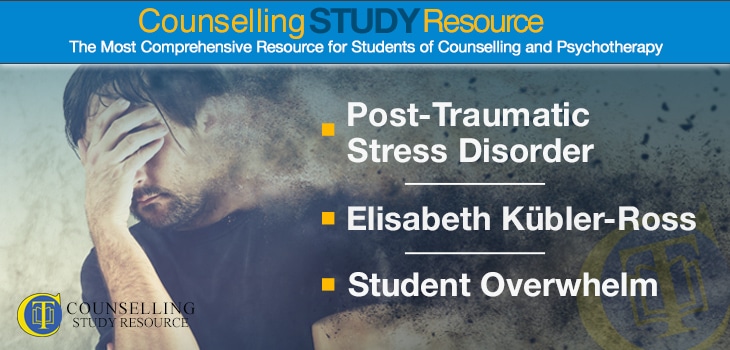029 – Post-Traumatic Stress Disorder – Elisabeth Kübler-Ross –Student Overwhelm
In episode 29 of the Counselling Tutor Podcast, Rory Lees-Oakes and Ken Kelly discuss post-traumatic stress disorder (PTSD). ‘Theory with Rory’ takes a look at the life and work of Elisabeth Kübler-Ross. Finally, the presenters discuss the feelings of overwhelm often faced by students of counselling and psychotherapy.
PTSD
Although the term ‘PTSD’ came into the psychotherapeutic lexicon following the Vietnam War, the phenomenon was recognised longer ago by other names, for example ‘going Asian’ following the Korean War, and ‘soldier’s heart’ or ‘shellshock’ in the Second World War.
PTSD is experienced by people who have been in very stressful situations (not just in the military) where they believed their or others’ lives were at serious threat. It is a very debilitating condition, which can vary in severity.
Although our role as counsellors is not to diagnose mental-health conditions, we may suspect a client is suffering from PTSD if feelings of terror are triggered by certain situations or senses (e.g. the smell of diesel or sound of fireworks). In this case, a referral to the GP (with the client’s permission) is recommended.
Current treatments include medication, and eye movement desensitisation and reprocessing (EMDR). Also, clients are often hugely comforted by knowing that what they are going through is normal given the situation they have experienced.
Elisabeth Kübler-Ross
Born in 1926 in Zurich, Switzerland, Elisabeth Kübler-Ross developed a strong social and work ethic from an early age. Later qualifying from Zurich Medical School, she moved to the USA to train as a psychiatrist. There, she also received training in psychoanalysis.
Horrified by seeing how dying patients were treated in hospital, she began to give lectures to students to help them understand how terminally ill patients were experiencing end-of-life care. Her desire to educate people about death and dying continued, and Kübler-Ross developed seminars based on qualitative interviews with terminally ill people.
This work led to her psychological hypothesis on the process of dying, sometimes known as ‘the five stages of grief’ or ‘DABDA’:
- Denial – ‘It’s not really happening.’
- Anger – ‘Why me? It’s not fair.’
- Bargaining – ‘I will alter my lifestyle; that will make things right.’
- Depression – ‘I’m so sad; why bother?’
- Acceptance – ‘I can’t fight it; I may as well prepare for it.’
Although this model has gained wide acceptance in the world of counselling and psychotherapy, it has also incurred a number of criticisms, for example:
- that it was developed as a model of dying, but has since been applied to bereavement too
- that it may not fit all clients (some of whom may go through the process in a different order, miss a stage, or even not experience any of the stages)
- that it may encourage counsellors to be prescriptive and apply the model rigidly, rather than seeing clients as having their own unique experiences
- that how people deal with death and dying is environment-dependent.
Kübler-Ross will be remembered for her pioneering work in the field of loss and grief, her care for people with AIDS, and her contribution to founding the hospice movement. She also wrote many books, perhaps most notably On Death & Dying: What the Dying Have to Teach Doctors, Nurses, Clergy & Their Own Families. Kübler-Ross died in 2004 in Arizona.
Student Overwhelm
Counsellor training can be a time of great stress, with the workload of assignments, placement and supervision as well as possible problems in relating to other students on your course and to your tutors. Many people have times when they think about giving up.
Ken and Rory offer a number of tips on how to get through dark times:
- Don’t bottle up your feelings – speak up to your tutor, supervisor, personal-development group and/or placement coordinator, as appropriate.
- Remember that you are in control – could you slow down a little for a while to make things easier?
- Be kind to yourself – you have achieved so much already.
- Remember that counsellor training is by nature demanding, as those who become counsellors are special people.
Links and Resources
On Death & Dying: What the Dying Have to Teach Doctors, Nurses, Clergy & Their Own Families by Elisabeth Kübler-Ross (published in 2014 by Scribner Book Company)


